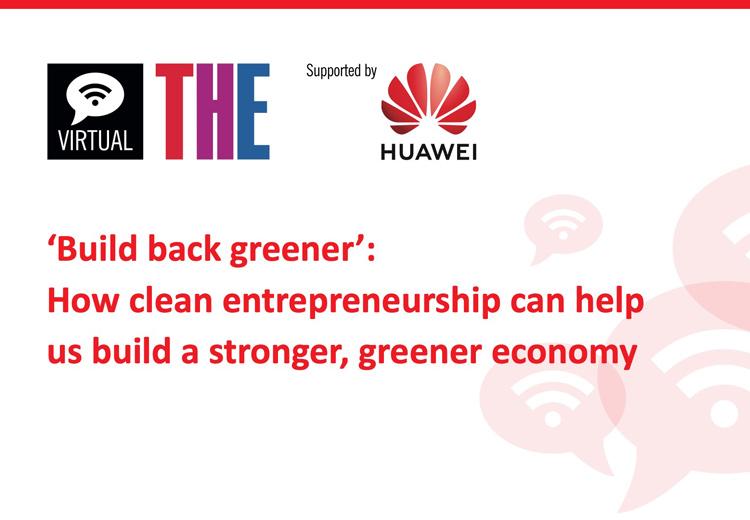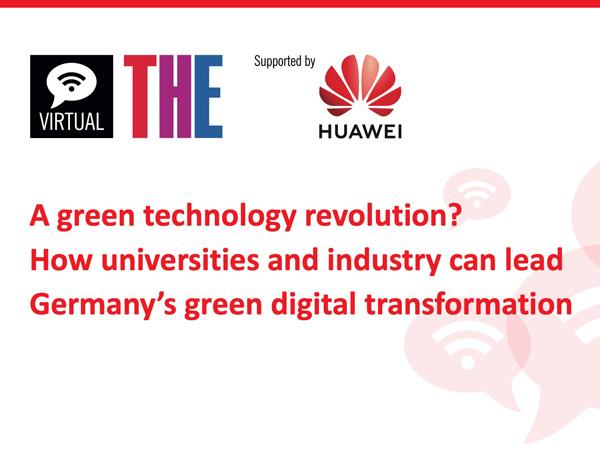With a green-minded generation of students, universities can develop clean entrepreneurs and use their expertise to help businesses meet net zero goals.
However, relationships with the business sector must improve to seize these opportunities, according to leaders from academia and the green investment sector speaking at a Times Higher Education round table, held in partnership with Huawei.
“Climate change and net zero are now on every board agenda,” said Beverley Gower-Jones, managing partner at the Clean Growth Fund. “We have something like seven years left to make a real dent in greenhouse gas emission reduction.” The panel was told that a technology typically takes 30 years to commercialise. “Time we don’t have,” Gower-Jones added, calling for universities to develop “a commercialisation superhighway”.
Sarah Lethbridge, pro dean of external engagement at Cardiff Business School, highlighted a disconnect between academia and the market. “There is a job to do to help academics realise the commercial potential of their work,” she said. Cardiff is building “an active, vibrant business community” in which it helps small businesses, medium-sized enterprises and corporations “mingle and learn from each other”.
The 5.5 million SMEs in the UK economy will form a major part of the move towards carbon reduction, explained Robert Wapshott, associate professor of entrepreneurship and innovation at the University of Nottingham’s Haydn Green Institute. He told the panel that universities were not yet as effective at sharing collaboration opportunities as they need to be.
Institutions must also factor in expectation management when collaborating with businesses, said Issa Chaer, director for research and enterprise at the School of the Built Environment and Architecture at London South Bank University. “Companies want results, testing and products very quickly. Universities have limited capabilities and some bureaucracies that we have to abide by in order to deliver,” he said.
The panel suggested that a lack of clarity and knowledge of green initiatives and net zero exists among businesses. This provides ample opportunity for universities and entrepreneurs to fill this gap.
“Universities have an exceptional knowledge and understanding of what net zero is and what it takes,” said Mark Charlton, net zero research theme director and associate director of SDG impact at De Montfort University. “We need to find a way to share it.
Charlton attended a meeting at the United Nations’ Economic and Social Council, which predicted sustainability to be the biggest growth area in industry globally in the coming years.
In an eco-minded culture, students of Robert Phillips, senior lecturer at the University of Manchester’s Alliance Manchester Business School, readily present green solutions, he said. But it is hard for students to start a business outside the “relatively safe” university incubator model, with just 5 per cent of students having their own business six months after leaving university. Especially in manufacturing, businesses require a lot of money to start, and it’s a big step for students to take, Phillips said.
The panel suggested that incubator accelerators, growth funds, student mentor programmes and venture capital firms could help students to transition into industry more successfully.
The panel:
- David Arkell, director of business development (academic), Faculty of Business and Law, Anglia Ruskin University
- Emily Burton, sustainable futures research theme lead, Nottingham Trent University
- Issa Chaer, director for research and enterprise, School of the Built Environment and Architecture, London South Bank University
- Mark Charlton, net zero research theme director and associate director of SDG impact, De Montfort University
- Harry Franklin, planning and performance executive, Nottingham Trent University
- Beverley Gower-Jones, managing partner, Clean Growth Fund
- Rachel Knox, social impact development officer, Cardiff Metropolitan University
- Alistair Lawrence, special projects editor, Times Higher Education (chair)
- Sarah Lethbridge, pro dean of external engagement, Cardiff Business School
- Robert Phillips, senior lecturer, Alliance Manchester Business School, University of Manchester
- Yuliana Topazly, senior lecturer in entrepreneurship, Kingston University
- Vera Trappmann, professor of comparative employment relations, University of Leeds
- Robert Wapshott, associate professor of entrepreneurship and innovation, Haydn Green Institute, University of Nottingham
Find out more about Huawei and higher education.


comment